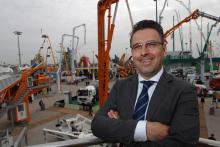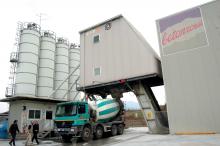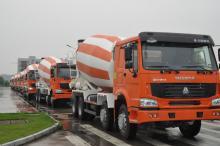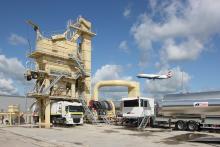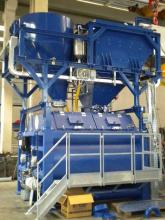There is a great deal of innovation across the concrete plant, pump and truck mixer sector. Guy Woodford looks at what some of the sector’s biggest names are offering. CIFA managing director Davide Cipolla believes the Zoomlion-owned Italian firm has “not reached the limit” of what it can offer customers, thanks to a significant investment in research and development. Speaking about a US$2.57 million-a-year (€2million) R&D investment in CIFA and some Zoomlion products over the last five years Cipolla, who i
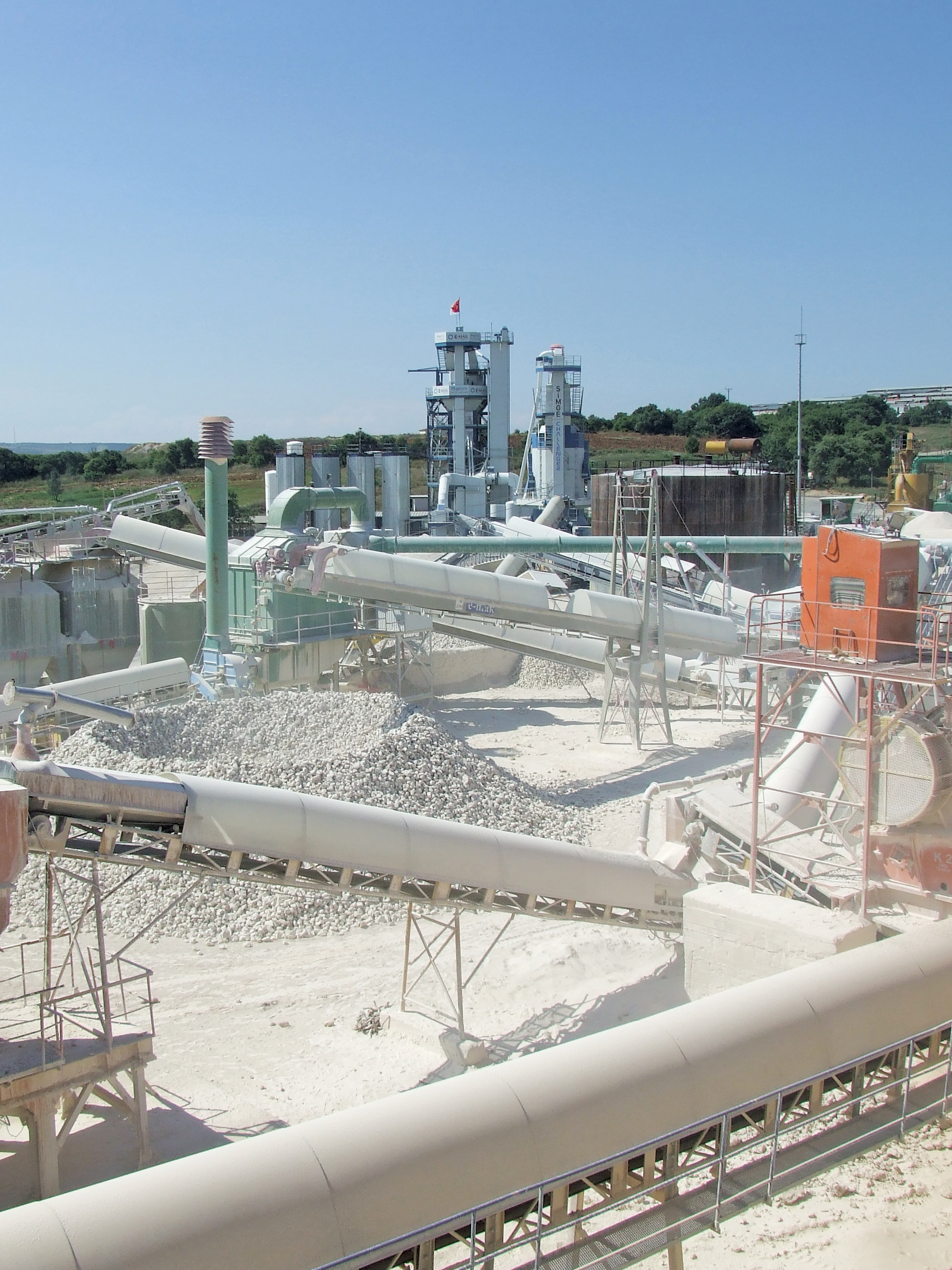
Turkish Challenger: tests on the E-Mak Challenger aggregate drying system will see if it can be used for high quality concrete production
RSS2203 CIFA managing director Davide Cipolla believes the 1175 Zoomlion-owned Italian firm has “not reached the limit” of what it can offer customers, thanks to a significant investment in research and development.
Speaking about a US$2.57 million-a-year (€2million) R&D investment in CIFA and some Zoomlion products over the last five years Cipolla, who is also research and development director of the Zoomlion Group's concrete division, said it marked only the “first stage” of product development.
During the recent688 Bauma 2013 exhibition in Munich, Germany, CIFA introduced an innovative hybrid plug-in truck mixer in the form of its Energya 9 model. While it features a conventional 9m³ capacity mixer drum, the rotational drive system is electric, and the machine is equipped with a lithium ion-type battery pack that is charged up while the truck is being driven, supported by regenerative braking.
When the mixer stops on-site, the drive to the drum is supplied either by the battery pack or can be plugged into a mains power supply. This allows the driver to turn off the engine and save on fuel, as well as reducing exhaust emissions. Mixing and unloading can be done using the battery pack or mains power, offering a significant reduction in overall fuel use over time.
The system has been developed in partnership with Milan Polytechnic and CIFA has filed a large number of patent applications for the technology.
“The prime market is the big key [customer] accounts, who understand that this is the future [for truck mixers] in Europe,” said Cipolla. “The need to find a cost-saving, fuel saving, and to tackle environmental and noise problems in the city centre has become more and more important.”
Of other results of R&D investment, Cipolla said the company’s carbon fibre boom and machine control technologies were major advances for the concrete machinery sector. Of the carbon fibre boom section, he added, “The material is so new. It is a continuous evolution. We do not know the limit. There are so many advantages. The only real problem is the cost. The carbon fibre is a niche production for the moment. The performance is so elevated in terms of lightness, more resistance, and more rigidity. It is the future.”
Cipolla said Russia, Brazil, China, India, Turkey, Saudi Arabia and Germany were some of the key future markets for the firm’s range of concrete machinery.
“Germany’s market is growing. Russia needs everything: infrastructure, buildings, and it has the [Sochi 2014 Winter] Olympics. Turkey is a little different. There has been a great boom in residential building and the government has the ability to invest.”
Having an international network with presence in many different countries is seen by Cipolla as a way of balancing critical dip market countries with booming ones, while still generating increased sales revenues and profits.
An example of a significant national sales dip is the 60% reduction in CIFA’s sales revenues in its native Italy in the last five years. However, Cipolla said the firm still retains 90% of the concrete machinery market.
“We are investing together with the [Zoomlion] Group in Brazil and India in order to have more possibilities for the future. We are starting now to build a production facility in Brazil to produce some products locally, in particular some truck-mounted pumps, truck mixers and batching plants.” Cipolla said the production plant, 70km north of São Paulo, was scheduled to open in 2014.
The focal point of2595 Simem’s stand at bauma 2013 was an example of its Eagle portable concrete batching plant, which is said to offer top performance at lower cost without compromising the firm’s emphasis on quality.
Modular elements with pre-installed pneumatic-electric systems are the key to enabling swift transfer of the Eagle plant from one project to the other.
The ‘super-mobile’ MMX range of plant from Simem – said to be the best solution available for faster moving sites such as railways and highways – was also highlighted at the show.
Northern Ireland-based316 Rapid International highlighted Rapid Transbatch, the latest model from its mobile batching plant range, during bauma 2013.
A compact solution in mobile batching, the plant contains the popular 3m3 Rapid twin shaft mixer and is capable of achieving actual working outputs of up to 100m3/hour. The Transbatch folds and partly dismantles for transport and can be set up in as little as 2-3 hours.
6791 Ammann says it has achieved “considerable success” in the firm’s native Switzerland and, more recently, abroad with its redeveloped EcoMix and GlobalConcrete ranges.
At the centre of the two ranges is the EcoModule with a proven Amix twin-shaft paddle mixer pre-assembled and tested at the manufacturing plant. Also equipped with Ammann’s latest as1 control technology, and capable of producing up to 190m³/hour of hardened concrete, the GlobalConcrete mixing plant is said to meet “every requirement placed on modern concrete production”.
1177 Lintec’s Aggregate Cooling System (ACS) is described as a new, patented and fully containerised plant concept for the direct cooling of aggregates for concrete mixes. ACS is said by the German firm to work in a desert environment without the usual and costly addition of specifically produced ice.
The patented ACS process uses pre-cooled water and a fan system to cool the fine sand as well as the bigger aggregates. The ACS system, available with new plants and through retrofitting on existing ones, is said to ensure cost savings of more than 50% compared to the use of the ice cooling system.
Meanwhile, Turkish firm208 E-MAK is investigating the potential of its Challenger aggregate drying system in a novel application. The firm was approached by a major contractor looking for a new way to produce high quality aggregate for use in concrete. The contractor is working on a landmark bridge crossing in Turkey and requires a very high quality concrete that will be able to provide the structural properties required for the project. Although developed for drying aggregate in asphalt applications, both E-MAK and the contractor feel the Challenger system has considerable potential for this concrete application. A series of tests and trials are being carried out at present to see if the Challenger can meet the requirements necessary.
The bridge structure will be expected to stand for over a century in a zone that can be affected by earthquakes while the crossing will also face a heavy traffic load. As a result the contractor is placing very stringent quality controls on the materials it will use in such an important project. The Challenger system is designed to store clean aggregate in dry conditions and in specific size grades and the contractor believes this will help ensure the quality of the stone used in the concrete. “They need a very clean and dry aggregate,” explained Emre Gencer, a member of the board of directors at E-MAK.
Fellow Turkish firm7487 Elkon claims its new Elkomix Quick Master Series of concrete batching plants have been designed to be compact and easily transportable.
As a result of the four series’ models – 25, 35, 60, and 120 – being able to fit into 40ft containers, Elkon says transport costs are reduced significantly, especially for export customers. The 25, 35 and 60 plant models, says Elkon, can be installed in just one day and, if necessary, on very small job sites. This is said to give construction companies the opportunity to install the concrete batching plants wherever they want, reducing project time loss. Each of the Elkomix Quick Master Series models can be installed on durable flat concrete surface. They do not require special concrete foundation for assembly, saving considerable money.
The Elkomix 25 Quick Master Compact Concrete Batching Plant has a 22m³/hour vibrated concrete production capacity, said to make it ideal for smaller capacity requirements.
Capable of a 30 m³/hour vibrated concrete production capacity, the Elkomix 35 model has been awarded the prestigious Design Turkey Superior Design Award.
The third model in the series, the Elkomix 60, has 50-55m³ vibrated concrete production capacity.
Finally, and said to meet customer demand for a bigger capacity Quick Master Series concrete batching plant, the Elkomix 120 has a 100-105m³ vibrated concrete production capacity. Elkon claims this model has brought a “new understanding to heavy-duty design”. It can be transported easily in containers and installed within 2-3 days.RSS
There is a great deal of innovation across the concrete plant, pump and truck mixer sector. Guy Woodford looks at what some of the sector’s biggest names are offering
Speaking about a US$2.57 million-a-year (€2million) R&D investment in CIFA and some Zoomlion products over the last five years Cipolla, who is also research and development director of the Zoomlion Group's concrete division, said it marked only the “first stage” of product development.
During the recent
When the mixer stops on-site, the drive to the drum is supplied either by the battery pack or can be plugged into a mains power supply. This allows the driver to turn off the engine and save on fuel, as well as reducing exhaust emissions. Mixing and unloading can be done using the battery pack or mains power, offering a significant reduction in overall fuel use over time.
The system has been developed in partnership with Milan Polytechnic and CIFA has filed a large number of patent applications for the technology.
“The prime market is the big key [customer] accounts, who understand that this is the future [for truck mixers] in Europe,” said Cipolla. “The need to find a cost-saving, fuel saving, and to tackle environmental and noise problems in the city centre has become more and more important.”
Of other results of R&D investment, Cipolla said the company’s carbon fibre boom and machine control technologies were major advances for the concrete machinery sector. Of the carbon fibre boom section, he added, “The material is so new. It is a continuous evolution. We do not know the limit. There are so many advantages. The only real problem is the cost. The carbon fibre is a niche production for the moment. The performance is so elevated in terms of lightness, more resistance, and more rigidity. It is the future.”
Cipolla said Russia, Brazil, China, India, Turkey, Saudi Arabia and Germany were some of the key future markets for the firm’s range of concrete machinery.
“Germany’s market is growing. Russia needs everything: infrastructure, buildings, and it has the [Sochi 2014 Winter] Olympics. Turkey is a little different. There has been a great boom in residential building and the government has the ability to invest.”
Having an international network with presence in many different countries is seen by Cipolla as a way of balancing critical dip market countries with booming ones, while still generating increased sales revenues and profits.
An example of a significant national sales dip is the 60% reduction in CIFA’s sales revenues in its native Italy in the last five years. However, Cipolla said the firm still retains 90% of the concrete machinery market.
“We are investing together with the [Zoomlion] Group in Brazil and India in order to have more possibilities for the future. We are starting now to build a production facility in Brazil to produce some products locally, in particular some truck-mounted pumps, truck mixers and batching plants.” Cipolla said the production plant, 70km north of São Paulo, was scheduled to open in 2014.
The focal point of
Modular elements with pre-installed pneumatic-electric systems are the key to enabling swift transfer of the Eagle plant from one project to the other.
The ‘super-mobile’ MMX range of plant from Simem – said to be the best solution available for faster moving sites such as railways and highways – was also highlighted at the show.
Northern Ireland-based
A compact solution in mobile batching, the plant contains the popular 3m3 Rapid twin shaft mixer and is capable of achieving actual working outputs of up to 100m3/hour. The Transbatch folds and partly dismantles for transport and can be set up in as little as 2-3 hours.
At the centre of the two ranges is the EcoModule with a proven Amix twin-shaft paddle mixer pre-assembled and tested at the manufacturing plant. Also equipped with Ammann’s latest as1 control technology, and capable of producing up to 190m³/hour of hardened concrete, the GlobalConcrete mixing plant is said to meet “every requirement placed on modern concrete production”.
The patented ACS process uses pre-cooled water and a fan system to cool the fine sand as well as the bigger aggregates. The ACS system, available with new plants and through retrofitting on existing ones, is said to ensure cost savings of more than 50% compared to the use of the ice cooling system.
Meanwhile, Turkish firm
The bridge structure will be expected to stand for over a century in a zone that can be affected by earthquakes while the crossing will also face a heavy traffic load. As a result the contractor is placing very stringent quality controls on the materials it will use in such an important project. The Challenger system is designed to store clean aggregate in dry conditions and in specific size grades and the contractor believes this will help ensure the quality of the stone used in the concrete. “They need a very clean and dry aggregate,” explained Emre Gencer, a member of the board of directors at E-MAK.
Fellow Turkish firm
As a result of the four series’ models – 25, 35, 60, and 120 – being able to fit into 40ft containers, Elkon says transport costs are reduced significantly, especially for export customers. The 25, 35 and 60 plant models, says Elkon, can be installed in just one day and, if necessary, on very small job sites. This is said to give construction companies the opportunity to install the concrete batching plants wherever they want, reducing project time loss. Each of the Elkomix Quick Master Series models can be installed on durable flat concrete surface. They do not require special concrete foundation for assembly, saving considerable money.
The Elkomix 25 Quick Master Compact Concrete Batching Plant has a 22m³/hour vibrated concrete production capacity, said to make it ideal for smaller capacity requirements.
Capable of a 30 m³/hour vibrated concrete production capacity, the Elkomix 35 model has been awarded the prestigious Design Turkey Superior Design Award.
The third model in the series, the Elkomix 60, has 50-55m³ vibrated concrete production capacity.
Finally, and said to meet customer demand for a bigger capacity Quick Master Series concrete batching plant, the Elkomix 120 has a 100-105m³ vibrated concrete production capacity. Elkon claims this model has brought a “new understanding to heavy-duty design”. It can be transported easily in containers and installed within 2-3 days.RSS



